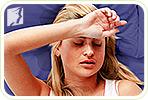The reproductive stages preceding menopause are referred to as premenopause and perimenopause. During perimenopause, many women suffer from night sweats, hot flashes, and other uncomfortable menopausal symptoms. While night sweats among 35-year-old women are not as common as those among 50-year-olds, they are generally not a cause for concern.
Why Do Night Sweats in 35-Year-Old Women Occur?
Regardless of a woman's reproductive stage, night sweats are most commonly triggered by a combination of changing hormone levels and environmental factors. Referred to in the medical world as “nocturnal hyperhidrosis,” night sweats can be blamed on an abrupt drop in estrogen levels. This reduction in turn affects the behavior of the hypothalamus, the segment of the brain responsible for regulating temperature, and causes it to mistakenly detect a surge of heat and order a cooling sweat.
Night sweats experienced by 35-year-old women can also be triggered by poor lifestyle habits. Women who keep a bad diet, lead an overly sedentary lifestyle, or maintain an excessively high body mass index are more likely to experience night sweats at an early age. Carrying excessive body weight in particular can lead to difficulties regulating temperature, as carrying extra weight generates extra heat.
It is also possible that night sweats experienced at the age of 35 can be unrelated to menopause and caused by issues such as fever, diabetes, thyroid disorders, or pregnancy.
How to Manage Early Night Sweats
The best treatment for night sweats in women at any age is to take good care of the body. A well-maintained body is much better equipped to cope with hormone level changes and ensure night sweats are kept under control. Sleeping well, sustaining a healthy diet, and observing an exercise routine are all vital factors for reducing the frequency and intensity of night sweats. To manage night sweats effectively, it is advised that women:
- Take a cool shower before bed
- Avoid eating spicy foods before sleeping
- Keep a fan by your bed
- Wear lightweight cotton pajamas
- Leave a window slightly open during the night
- Sleep under thin blankets
- Drink plenty of water
- Avoid caffeine and alcohol
- Exercise regularly
- Eat a diet rich in whole grains, protein, fruits, and vegetables
In the case of severe night sweats, adopting lifestyle alterations might not provide sufficient relief. In such cases, combining changes with natural herbal supplements can reduce the intensity of the symptoms.
If you find that your night sweats are occurring more frequently or that they don't improve with the aid of self-help therapies, consulting a doctor is advisable.
Read more about the different treatments for night sweats.
Sources
- The National Institute of Health. (n.d)."Signs of the Menopausal Transition" .Retrieved from www.nih.gov
- Boston Women's Health Collective. "Hot Flashes, Night Sweats and Sleep Disturbances". Our Bodies, Ourselves, 2006.
- Von Muhlen, DG, et al. "A community-based study of menopause symptoms and estrogen replacement in older women". Maturitas. Sept 1995; 22(2):71-8.




